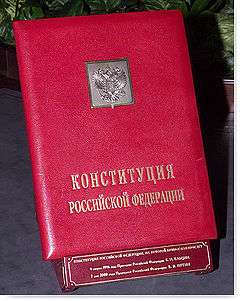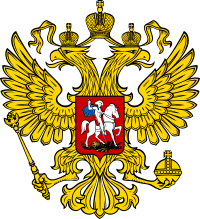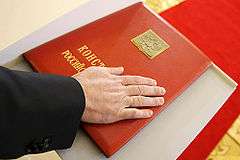Constitution of Russia
| Constitution of the Russian Federation | |
|---|---|
 Presidential copy of the Constitution. | |
| Territorial extent | Russia |
| Signed by | Citizens of Russia |
| Date effective | December 12, 1993 |
| Status: In force | |
| Constitution of the Russian Federation | |
| Russian | Конституция Российской Федерации |
|---|---|
| Romanization | Konstitutsiya Rossiyskoy Federatsii |
| This article is part of a series on the |
| Politics of the Russian Federation |
|---|
 |
The current Constitution of the Russian Federation (Russian: Конституция Российской Федерации, Konstitutsiya Rossiyskoy Federatsii; pronounced [kənsʲtʲɪˈtutsɨjə rɐˈsʲijskəj fʲɪdʲɪˈratsɨɪ]) was adopted by national referendum on December 12, 1993. Russia's constitution came into force on December 25, 1993, at the moment of its official publication, and abolished the Soviet system of government. The current Constitution is the second most long-lived in the history of Russia, behind the Constitution of 1936.
The 1993 Constitutional Conference was attended by over 800 participants. Sergei Alexeyev, Sergey Shakhray, and sometimes Anatoly Sobchak are considered as co-authors of the constitution. The text of the constitution was inspired by Mikhail Speransky's constitutional project and current French constitution.[1]
A constitutional referendum was held in Russia on 12 December 1993. Of all registered voters, 58,187,755 people (or 54.8%) participated in the referendum. Of those, 32,937,630 (54.5%) voted for adoption of the Constitution.[2] It replaced the previous Soviet-era Constitution of April 12, 1978 of Russian Soviet Federative Socialist Republic (which had already been amended in April 1992 to reflect the dissolution of the Soviet Union and the sovereignty of the Russian Federation), following the 1993 Russian constitutional crisis.
History
Constitution of Russia after USSR
Structure
The constitution is divided into two sections.
Section One
- Fundamentals of the Constitutional System
- Rights and Liberties of Man and Citizen
- Federative system
- President of the Russian Federation
- Federal Assembly
- Government of the Russian Federation
- Judiciary
- Local Self-Government
- Constitutional Amendments and Revisions
Section Two
- Concluding and Transitional Provisions
Provisions
Especially on human rights and fundamental freedoms, the Constitution provides for human rights and freedom of citizen according to the universally recognised principles and norm of international law as well as the Constitution[3] and affirms that the listing in the Constitution of the Russian Federation of the fundamental rights and freedom shall not be interpreted as a rejection and derogation of other universally recognised human rights and freedom.[4]
Presidency

The Constitution of the Russian Federation specifies that the President is the Russian head of state, setting domestic and foreign policy and representing Russian both within the country and internationally [Article 80][5]. While the original constitution stipulated a four-year term and a maximum of two terms in succession, the current constitution decrees a six-year term. The four-year term was in effect while Vladimir Putin served his first and second terms; with the two-term limit he was barred from the presidency in 2008. Instead, he served as Prime Minister while Dmitry Medvedev served as president for four years. Putin was re-elected to his third term in 2012; with the six-year term, he was elected to his fourth term in 2018. Article 81 specifies the method of election, including a secret ballot; Articles 82 - 93 detail powers, responsibilities, and limitations of the presidency. The constitution provides for a 'strong presidency'; not only is the president the "Supreme Commander-in-Chief of the Armed Forces of the Russian Federation"[6], the president also has the power to dissolve the State Duma[7].
Executive branch
Legislative branch
Judiciary
While the Russian Federation Constitution enumerates a strong and independent judicial branch, the reality is a question of debate. The constitution provides for judicial immunity, lifetime appointments/"irremovable" justices, and the supremacy of the courts to administer justice, and affirms that judges need only submit to the constitution and the federal law[8]. Additionally, Article 123 provides for open and fair trials, as well as equal application of the law[9]. Three courts are delineated: Constitution Court of the Russian Federation, the Supreme Court of the Russian Federation, the Higher Arbitration Court, each "Appointed by the Council of the Federation upon the proposals by the President"[8]. The Constitution requires 19 judges for the Constitution Court[8], but does not specify the number of justices for the other courts. As of 2002, the Supreme Court has 115 members[10]; due to expansion of duties in 2014 the number of seats was increased to 170[11]. In September of 2014, the Institute of Modern Russia reported that the Russian Federation's Supreme Arbitration Court had been dissolved, and judicial matters previously under its authority had been transferred to the jurisdiction of the Supreme Court[11].
Despite the ideals written into the constitution, most citizens do not feel that they will receive justice[12]; additionally, human rights violations occur regularly[13].
See also
Notes
- ↑ Sergey Shakhray - The Voice of Russia on YouTube
- ↑ Constitution of Russia: nature, evolution, modernity 1.4.2 National character. (in Russian)
- ↑ Article 17
- ↑ Article 55. 1
- ↑ Ministry of Foreign Affairs of the Russian Federation.
- ↑ "THE CONSTITUTION OF THE RUSSIAN FEDERATION". www.mid.ru.
- ↑ "Chapter 4. The President of the Russian Federation - The Constitution of the Russian Federation". www.constitution.ru.
- 1 2 3 "Chapter 7. Judicial Power - The Constitution of the Russian Federation". www.constitution.ru.
- ↑ "Russian Constitution SECTION ONE Chapter 7". www.departments.bucknell.edu.
- ↑ Judiciary_of_Russia#Supreme_Court
- 1 2 Mishina, Ekaterina (September 30, 2014). "Who Shall Judge?".
- ↑ Terrill, Richard J. (April 7, 2010). "World Criminal Justice Systems: A Comparative Survey". Routledge – via Google Books.
- ↑ "Russia must strengthen the independence and the impartiality of the judiciary".
References
- Gönenç, Levent (2002). Prospects for Constitutionalism in Post-Communist Countries. Kluwer Law International. ISBN 90-411-1836-5.
- Jeffries, Ian (1996). A Guide to the Economies in Transition. Routledge. ISBN 0-415-13684-9.
- Partlett, William. The Dangers of Popular Constitution-Making, Brooklyn Journal of International Law, Volume 38, 193-238 (2012). Available at http://papers.ssrn.com/sol3/papers.cfm?abstract_id=1924958.
External links
| Wikimedia Commons has media related to Constitution of the Russian Federation. |
| Wikisource has original text related to this article: |
- Text of the Russian constitution in English, on Constituteproject.org
- Text of the Russian constitution in Russian – from the official website of the Government of the Russian Federation
- Text of the Russian constitution in English - archived from an official website of the Government of the Russian Federation
- The Russian Constitution, with the Russian text and unofficial translations to English, German, and French
- Amendments to the Russian Constitution
- Information about the Russian Constitution
